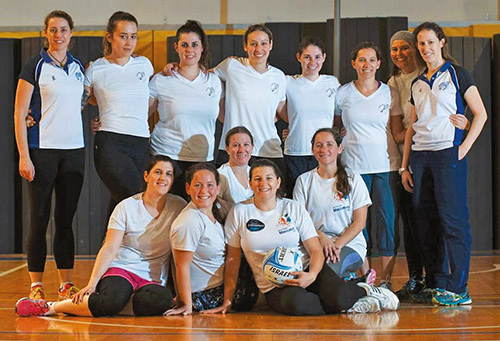

Shan Berman is proving that women’s lives can be changed through sport. She fondly remembers herself as an 8-year-old tomboy who climbed trees in her wooded backyard in Port Jervis and ran alongside boys her age on the basketball court and sports field. After making aliyah with her siblings and parents in 1982, she continued to hone her athletic abilities in school, playing softball, volleyball, basketball and any other sport she was invited to try. And when she was told that girls aren’t strong enough or fast enough, she pushed herself harder.
Shortly after Berman married, she was invited by an English friend to play netball, a team sport similar to basketball that is popular in the UK but was fairly unknown at that time in Israel. Berman quickly caught on and made Israel’s national women’s team, spending 14 years traveling around Europe representing the Jewish State in the sport, while juggling a full-time job and raising four children with her husband. A series of injuries led her to coaching and since 2017 she has served as the coach of the national team, working with hundreds of women and girls over the past four years.
Berman recalls the times when as a young mother she would arrive at her games with a baby in one hand and a ball in the other. “It was my time to run around the court and be me, which many women don’t get. It really was mentally and physically my saving grace. I would find a babysitter or would bring a baby to court and pause to nurse the baby, but I wasn’t missing my game.”
Berman views netball not only as a recreational activity that provides fun and fitness but as a tool for women’s empowerment. “My belief is that many women have low self-esteem, especially in Israel, where female sport does not receive much treatment. Girls can go through high school without doing sports even once. They feel they are not good at it. Guys are pushed but girls are not. Netball makes a huge difference for a lot of people. It encourages people for positive self-esteem and self-image, which a lot of women do not have.”
It is this outlook that Berman brings to the court as a coach. She looks at her team as a unit, assessing the strengths of each team member and enhancing each person’s individual abilities within the context of the group. When younger girls have doubts about their individual capabilities, she encourages each one to see the best in herself and to focus on how she can contribute to the overall team, rather than on where she is lacking. “Once they realize ‘the coach wants me on the team because of me and not what I can be,’ it is huge because you see them shine,” says Berman.
One player named Batya was very shy and had low self-esteem when she joined the team as a teenager. Berman was impressed with her speed and placed her in the spotlight in mid-court where she was most needed, despite Batya’s insecurities. Today Batya is a commander in the army, responsible for 15 combat soldiers under her. Berman shared, “She called me before Rosh Hashanah and told me, `You wouldn’t believe it, but I am commanding other soldiers. Now I am an officer and I am in charge!’ The fact that she thought to call me three years after I coached her touched me so much. I told her at the end of the call that I always knew she could do it.”
Coaching Israel’s national team is not free of challenges. Other national teams do not have the same impediments that Israel’s national team has. Minimal funding is allocated to netball in Israel. The players, umpires and coaches—including Berman—are volunteers. Other national teams receive subsidies for travel, allowing players to participate in more tournaments and gain more international experience. When Israel’s national team travels abroad for a competition, the team members must raise their own funds. Berman also loses many of her top players for a few years during their army or national service.
Berman is aware that she must work a lot harder than other coaches. But these challenges do not dampen her spirit. “We play with a smile on our face. We walk in singing ‘Am Yisrael Chai’ and dancing with everybody. We represent Israel in the best way.”
Though Israel is yet to medal in an international competition, Berman refuses to give up. And when there is a large gap in the score, Berman pushes her team’s limits, encouraging each player to put up a fight. The same fighting spirit that guided Berman as an eight-year-old in Port Jervis leads her today on the court in Israel and has empowered hundreds of young girls and women.
Alisa Bodner is a Fair Lawn native who immigrated to Israel a decade ago. She is a nonprofit management professional who enjoys writing in her free time.













